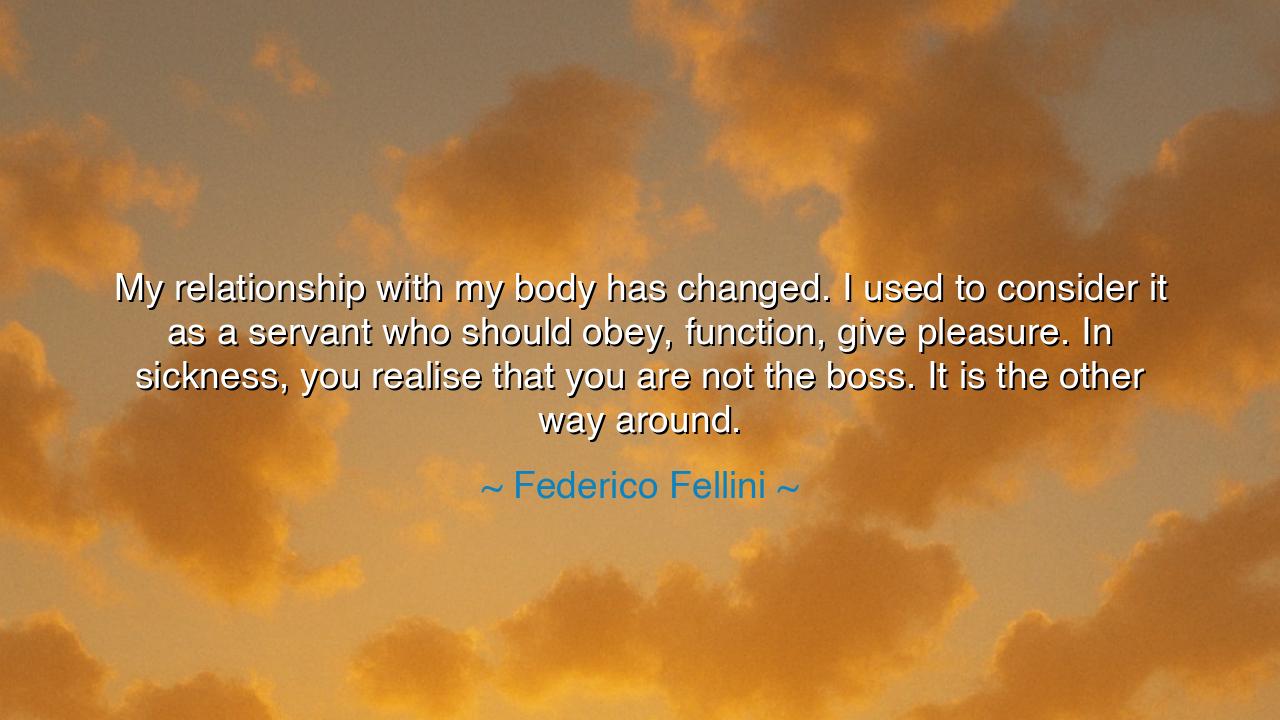
My relationship with my body has changed. I used to consider it
My relationship with my body has changed. I used to consider it as a servant who should obey, function, give pleasure. In sickness, you realise that you are not the boss. It is the other way around.






Hear the solemn wisdom of Federico Fellini, who declared: “My relationship with my body has changed. I used to consider it as a servant who should obey, function, give pleasure. In sickness, you realise that you are not the boss. It is the other way around.” In these words lies the humbling revelation of mortality—that the body is not a slave of the will, but a sovereign in its own right, demanding respect and reverence.
He speaks of the old illusion: to treat the body as servant, a tool of desire, a vessel for pleasure and command. In youth, when strength flows freely and sickness is but a distant shadow, man believes himself master. He demands of the flesh tireless obedience, expecting it to yield without limit. But such pride is vanity, for the body is not an endless well, and every vessel has its breaking.
When sickness comes, the illusion shatters. The proud discover that the flesh has laws higher than the will, and that no command of the mind can overturn the decree of frailty. Here Fellini unveils the deeper truth: that man’s soul and body are not tyrant and servant, but companions in a fragile covenant. To abuse one is to endanger the other; to neglect one is to bring ruin upon both.
Thus his words are not despair but awakening. To acknowledge that the body is the master in moments of weakness is to finally learn humility. It teaches reverence for the limits of flesh, and gratitude for the days of health. From this comes a gentler way of living—one that listens to the body, honors its rhythms, and does not despise its frailty, but cherishes its gift.
Let this teaching be remembered: do not treat the body as a slave to your hunger, but as a temple that sustains your soul. Strength will fade, sickness will come, yet wisdom is born in learning to walk with the body, not against it. Fellini’s words shine as a lantern for the generations, a reminder that mastery is not domination, but harmony with the vessel in which our spirit dwells.






HTHuyen Trang
I find this perspective so humbling. It speaks to the fact that, no matter how much control we think we have, our bodies are ultimately in charge. Illness serves as a reminder of this. But how do we deal with the shift in mindset when we’re faced with sickness? Is it possible to learn this lesson without having to go through something as difficult as an illness? How can we practice body awareness and gratitude before we’re forced into it?
YNNguyen Le Yen Nhi
Fellini's quote brings to light an uncomfortable but important truth: our bodies are not machines that exist solely to serve us. It makes me wonder if we tend to ignore our bodies’ signals until something goes wrong. Is it only through illness that we recognize our dependency on our bodies, or is it possible to embrace that relationship before it’s too late? How do we develop a healthier, more balanced view of our body’s role in our lives?
HHNguyen Hoang Hiep
This quote hits home in a powerful way. It’s almost as if Fellini is saying that we need to rethink our whole relationship with our bodies. We often push ourselves beyond limits, thinking we’re invincible, but the moment sickness or injury occurs, we realize we’re not in charge. How can we cultivate a more compassionate relationship with our bodies to avoid taking them for granted? Can we truly appreciate our bodies’ power and vulnerability at the same time?
THTran Huynh.
Fellini’s words challenge our usual approach to the body—treating it as a tool for our desires and needs. But when sickness strikes, it flips the script. This makes me wonder: do we take our health for granted when everything is functioning well? And how can we learn to respect our bodies more before they remind us of their power during times of illness or pain?
TDNguyen Thuy Duong
This quote really makes me reflect on the way we often view our bodies as something to be controlled or conquered. It’s fascinating how Fellini describes the shift from seeing the body as a servant to understanding it as something that commands attention. But what happens when this relationship becomes strained, such as during illness or injury? How do we reconcile the idea of being in control with the reality of being vulnerable in the face of health challenges?